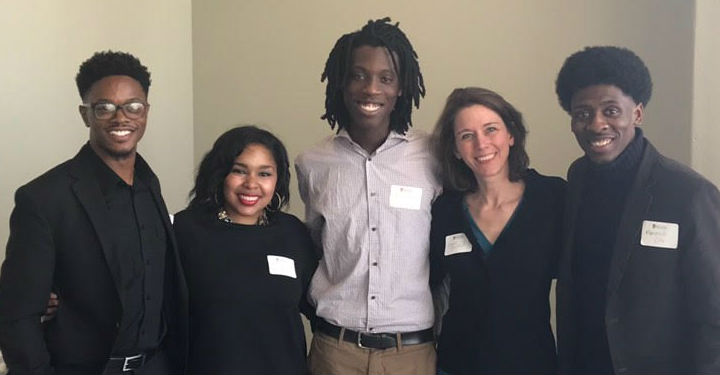
 New, creative, innovative thinking isn’t just for that cool tech startup.
New, creative, innovative thinking isn’t just for that cool tech startup.
That was the message of the spring summit of UW-Madison’s organization Law and Advocacy for Racial Justice (LAARJ). The summit, titled Innovation for Social Change, brought together several UW Law students, paralegals, and attorneys at UW Hillel to share ideas, historic cases, contemporary cases and experiences in how innovation plays its role in the justice system.
The summit addressed topics like Juvenile Justice Reform, Eviction Defense Training, and more, a featured a keynote speech from Sachin Chheda, director of the Fair Elections Project (A Wisconsin-based campaign to eliminate partisanship r from the process of drawing election district maps.
“This [Summit] is thinking about social changes in Wisconsin. We have some of the worst disparities right here. There is innovation in tech, but we have to apply the same enthusiasm about social justice,” said LAARJ president Reginald Thedeford, Jr.
Moderator E’Bria asked several panelists about juvenile justice and their experience in the field, to which they all gave opinions as well as solutions.
“If you want to have a voice in society, you have to pay attention to society,” said retired Justice Louis Butler, the first African American to serve on the Wisconsin Supreme Court. “No one cares about a judge until they’re standing in front of one…If you’re not watching, things that affect your future are happening.”
“There’s always a shortage of money. Never a shortage of money on prisons, on war or thing you want to do.” said Dorsey Nunn, the Executive Director of Legal Services for Prisoners with Children. “My suggestion of what you can do with juvenile and criminal justice systems is close as many as you can down … you hide behind a rhetoric, but won’t admit you hold slaves. I’m 66 years old and I’m still wrestling with being a good citizen when I wasn’t given the rights of a full citizen.”
“It starts with having empathy for others. I would suggest out teachers, social workers, and others have implicit bias justice training. So we have everyone be aware of our biases and to check them at the door,” said Attorney Jennifer Johnson, a staff attorney with the Legal Action of Wisconsin, Inc.
“It’s important to not have knee jerk reaction to the perception of increased crimes and trying to come up with quick solutions. We have to look at evidence-based data and numbers to craft what solutions are,” said Kori Ashley who is also a staff attorney at the Legal Action of Wisconsin, Inc.
Associate Clinical Law Professor and Director of the Neighborhood Law Clinic, Mitch, led a session on the importance of eviction defense, how to do it, and how to get involved with the Legal Action of Wisconsin to make a difference.
Responding to moderator Kenneth Cole’s questions about the importance of community organizing, and the role of personal values in community work, the panelists responding with personal experiences and ways to improve the community through personal work.
“Community organizing is important because that can really expose the points of power in the system as a community. That’s how you can really start to make a change,” said UW Madison student Tyriek Mack, who has been involved in several campus initiatives involving standardized testing and campus meal plans.
“It takes a village to raise a child,” said social entrepreneur and founder of Jewels Inc., and organization dedicated to empowering young urban girls. “My organizations…it’s about reaching down to pull forward.”
“Lawyers say, ‘I wish I could do…’ I say just do it,” said Harvard Clinical Law Professor Susan Crawford, who is running for Dane County Judge in the April 3 election. “It’s about getting the right parties into the case,” she said, referencing her work in defending the League of Women Voters, Planned Parenthood, and Madison teachers.
“Our expectation is that your vote counts…when it doesn’t it’s hard to get engaged,” said Democratic activist Sachin Chheda, who was one of a group of citizens who launched the case to limit partisan gerrymandering currently pending before the United States Supreme Court. “We just had a bunch of people sitting around a table and did it. We had 12 plaintiffs and raised money and filed a case.”
The grassroots organization LAARJ formed after several Wisconsin Law student organizations collaborated in the hosting of a forum regarding mass incarceration as well as the screening of the documentary “13th” in 2016.
LAARJ has addressed the need for reform in the past with issues like The School to Prison Pipeline, community control of police, Badger State Industries & privatized prisons, Opportunities for education in prison, and more. They’ve partnered with JLSA, State Bar of Wisconsin, and Hillel for events.
Their mission, according to their Facebook page: Law And Advocacy for Racial Justice advocates for the political, social, and economic equity of people of color. LAARJ is a grassroots student organization promoting social justice and eliminating barriers to the progress of people of color in the State of Wisconsin.
A few long term objectives the organization focuses on include improving the criminal justice system by promoting justice over finality, eliminating mass incarceration in Wisconsin, eliminating systematic racism in the criminal justice system, promoting education over incarceration, and establishing a LAARJ pro bono clinic, specializing in providing representation at revocation hearings as well as in voter education. They encourage students, staff, and community members to join.
This story was produced by a student in the Madison365 Academy. To learn more and support our educational programs, visit madison365.org/academy.




